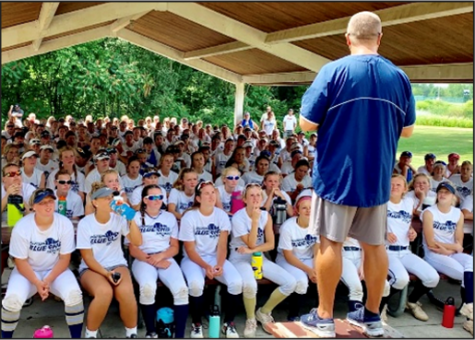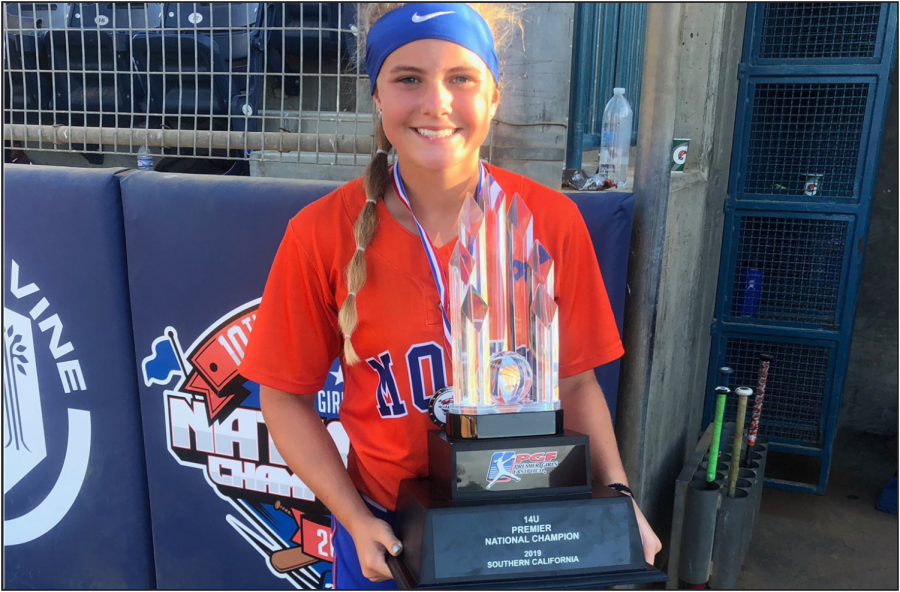The paradox of early softball recruiting
Taylor Pannell stands with the PGF 14U National Tournament trophy.
May 25, 2021
In the largely competitive world of softball, many athletes are hopeful to continue playing the game at the collegiate level. College coaches start attending competitive showcases to begin scouting girls as young as 13 years old. This has become a very big issue, which demands a change.
In 2018, the recruiting rule changed for girls fastpitch softball. Generally speaking, coaches from any division level can begin talking to recruits on Sept. 1 of their junior year. This newly implemented rule focused on the alarming trend of girls 13 years and younger being pressured by college coaches to make verbal commitments.
A major criticism of this early recruiting process is the damage it has on a developing athlete’s mental health. College softball coaches often push these athletes into a corner where they are forced to make a decision without exploring other options first.
Early recruiting for fastpitch softball is exactly the opposite of how any healthy recruiting process should be. In a normal process, these athletes are given offers, and they research all that the school has to offer and make a decision based on what is the best fit for themselves.
As for the early process, these girls verbally commit and then begin to research the softball program, the academics, and the school after already making a decision. This can lead to a difficult situation if one has already verbally committed and comes to realize the school she chose is not the right fit.
Taylor Pannell, a top 10 player in the Class of 2022, is a great example of why early recruiting creates forced decisions. After the NCAA announced it would be creating stricter recruiting rules, there was a three-month-long period in which college coaches and softball athletes rushed offers and verbal commitments.
According to an article by Extra Inning Softball, Pannell quickly committed to Auburn University because she felt a rush of pressure to beat the rule change. However, Panell decided that Auburn University was not the best fit for her and decommitted shortly after accepting her offer. “The reason I decommitted from Auburn University is because I wanted to make sure it was the right place for me,” said Pannell.
Committing to a school at any age is a major life decision. Pannell was forced to do this within the span of a couple months. The decision she made to decommit helped her weigh out her options, and ultimately took away added stress about all of the unknown factors.
Pannell is now committed to the University of Tennessee and is currently competing in her junior year of high school softball.
Many major showcase tournaments across the country are attended by hundreds of college coaches at a time. Before the new rules were implemented, this placed a great deal of pressure on the young athletes. If an athlete is outperformed or makes a single error, it is likely his/her name is crossed off a list, and college coaches move on to the next player.
Not only are these early recruiters diminishing the mental health of young athletes, they are predicting the value of a player before they have been fully developed. Before the new recruiting rule was changed, some girls were verbally committing to a college as early as eighth grade.
In addition to the skill set still developing for that player, their bodies are maturing too. On younger teams, it is a lot easier to stand out if you are the strongest or tallest on the field. That is what catches the attention of a recruiter. For any late developers, they aren’t given a fair chance. Predicting the type of player that a fastpitch athlete may turn out to be can be a risky move.
Although schools want top-tier athletes, they also focus on academics.
Another problem with early recruiting is that students who excel academically in middle school might struggle when they get to high school. This means that athletes may lose their offers at the last minute if their academic qualifications are over projected.
Ultimately, this early recruiting posed many dangers to the wellbeing of young athletes before it was banned. However, sometimes committing to a college for softball can take a lot of pressure off a competitive player. Knowing that one has made a decision allows athletes to play loose and relaxed on the field. Added pressure has definitely been known to affect performance.
As the world of sports evolves, we see an increase in the pace of play, a rise in competitiveness, and greater numbers of athletes continuing their sports at the next level. Delaying contact between young athletes and college coaches is the best way to ensure that athletes are making the right decision for themselves, and doing it in a healthy way.

